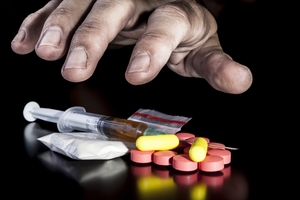Defending Mentally Ill Criminal Clients
 As a criminal lawyer practicing in St. Augustine, Florida, I defend many clients charged with drug possession crimes or violations of drug offender probation. During my initial meeting with a new client, I focus primarily on the events surrounding their arrest. A clear understanding of the facts allows me to determine what additional investigation needs to be done and what witnesses need to be interviewed or deposed.
As a criminal lawyer practicing in St. Augustine, Florida, I defend many clients charged with drug possession crimes or violations of drug offender probation. During my initial meeting with a new client, I focus primarily on the events surrounding their arrest. A clear understanding of the facts allows me to determine what additional investigation needs to be done and what witnesses need to be interviewed or deposed.
Drugs Used to Self-Medicate Mental Illness
While listening to my clients describe what happened, they often go into their personal background and history. As you may expect with this type of charge, many clients describe a history of drug use and abuse. The reasons they give for using or abusing drugs vary widely. However, you may be surprised to learn that many describe using illegal or non-prescribed drugs to self-medicate their mental illnesses. Whether to elevate or depress their mood, they typically say that it keeps them stable.
When people come into the criminal justice system for the first time, many are offered probationary sentences or probation after short stays in the St. Johns County Jail. Many jump at the chance to get out of jail without even consulting a criminal defense lawyer. As such, many defendants suffering from mental illness make it back out onto the streets without ever receiving an evaluation or treatment. However, if they fail to disclose the true cause of their drug use many are doomed to repeat their mistakes and find themselves back in jail facing a violation of probation.
Criminal Justice Isn’t the Solution to Mental Health Problems
The stated goal of the criminal justice system is to punish. When a defendant has been given a chance at probation and failed due to continued drug use, the typical sentence handed out by the judges in the County and Circuit courts of St. Johns County is jail or prison depending on whether their charge is a misdemeanor or felony. Warehousing these defendants in jail, for however long, does not solve their issues. It only returns them to the street facing the same mental health challenges that led them to use and abuse drugs in the first place. The challenge I face as the attorney for these clients is how to not only protect their constitutional rights, but also get them the mental health services they need.
Alternative Sentencing for Mental Health in St. Johns County
My opportunity to truly serve these clients comes once they confide in me that they want mental health help. First, I look for assistance from friends and family of the client who have personal experience with the client and have experienced the behavior that mental illness brings. I also try to obtain any documentation available related to any prior evaluations or treatment they may have received. Armed with this information, I take up their cause with the Probation Officer and Assistant State Attorney assigned to our case. While the ultimate decision of what to do is made by the judge, the opinions and recommendations of the Probation Officer and Prosecutor often carry significant weight. By convincing the Prosecutor and Probation Officer that mental health assistance is appropriate for my client, I go into the sentencing hearing with allies rather than adversaries.
At the sentencing hearing, the judge listens to the arguments of the Prosecutor, Probation Officer, and Criminal Defense Attorney about what should happen to the defendant. Having hopefully converted the Prosecutor and Probation Officer into allies, I turn then to friends and family of my client to help convince the judge to give my client a chance at mental health treatment. An overview of the client’s history from a family member or friend can be incredibly powerful at a sentencing hearing. I then close my presentation on behalf of my client with a plea to the judge that my client needs mental health help, and this is the opportunity for them to receive it. This approach to using mental health treatment in lieu of incarceration has been proven to work, as evidenced by the case of the Criminal Mental Health Project in Miami-Dade County, which was cited in a Los Angeles Times article from last year as reducing recidivism rates from 72% to 20% for misdemeanor offenders who suffer from mental illness.
If you or a friend or family member is facing a drug possession charge or violation of probation, and especially if you feel they may suffer from a mental illness, call The Albaugh Law Firm today to receive a free case consultation.
